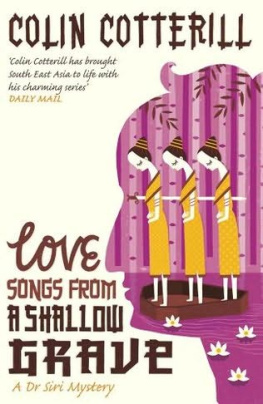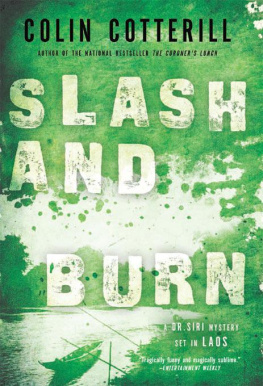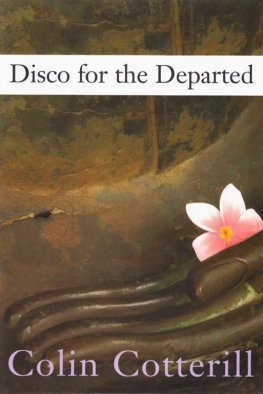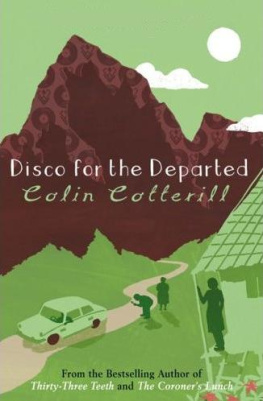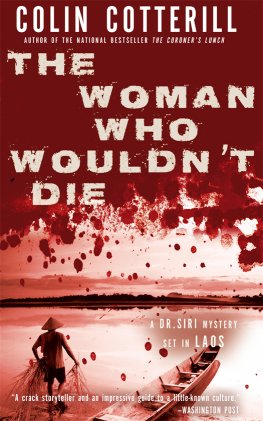Colin Cotterill - Anarchy and Old Dogs
Here you can read online Colin Cotterill - Anarchy and Old Dogs full text of the book (entire story) in english for free. Download pdf and epub, get meaning, cover and reviews about this ebook. year: 2009, publisher: Quercus, genre: Detective and thriller. Description of the work, (preface) as well as reviews are available. Best literature library LitArk.com created for fans of good reading and offers a wide selection of genres:
Romance novel
Science fiction
Adventure
Detective
Science
History
Home and family
Prose
Art
Politics
Computer
Non-fiction
Religion
Business
Children
Humor
Choose a favorite category and find really read worthwhile books. Enjoy immersion in the world of imagination, feel the emotions of the characters or learn something new for yourself, make an fascinating discovery.

- Book:Anarchy and Old Dogs
- Author:
- Publisher:Quercus
- Genre:
- Year:2009
- Rating:3 / 5
- Favourites:Add to favourites
- Your mark:
- 60
- 1
- 2
- 3
- 4
- 5
Anarchy and Old Dogs: summary, description and annotation
We offer to read an annotation, description, summary or preface (depends on what the author of the book "Anarchy and Old Dogs" wrote himself). If you haven't found the necessary information about the book — write in the comments, we will try to find it.
Anarchy and Old Dogs — read online for free the complete book (whole text) full work
Below is the text of the book, divided by pages. System saving the place of the last page read, allows you to conveniently read the book "Anarchy and Old Dogs" online for free, without having to search again every time where you left off. Put a bookmark, and you can go to the page where you finished reading at any time.
Font size:
Interval:
Bookmark:
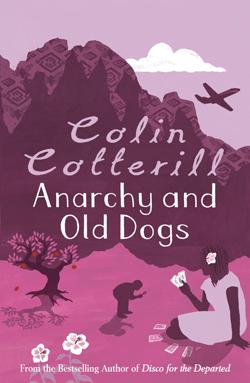 |
Colin Cotterill
Anarchy and Old Dogs
The fourth book in the Dr Siri Paiboun series
2007
A blind retired dentist has been run down by a logging truck on the street in Vientiane just opposite the post office. His body is duly delivered to the morgue of Dr. Siri Paiboun, the official and only coroner of Laos. At the age of seventy-four, Dr. Siri is too old to be in awe of the new communist bureaucrats for whom he now works. He identifies the corpse, helped by the letter in the mans pocket. But first he must decipher it; it is written in code and invisible ink. The dentists widow explains that the enigmatic letters and numbers describe chess moves, but they are unlike any chess symbols Siri has previously encountered. With the help of his old friend, Civilai, now a senior member of the Laos politburo; Nurse Dtui (Fatty); Phosy, a police officer; and Aunt Bpoo, a transvestite fortune-teller, Dr. Siri solves the mystery of the note and foils a plot to overthrow the government of Laos.
A NOTE TO A BLIND DENTIST
T he post office box was eighteen across, twelve down, and it had a loop of wool wound around the door so Dr Buagaew wouldnt miss it. He traced the keyhole with his left hand and inserted the key with his right. From inside the wooden chamber came the scent of bygone correspondence: of brown-paper parcels and glue, of old parchment and secrets. His hand fell upon a thin envelope. He knew it would be there and he knew what it contained because only one other person was aware of the post office box address.
He relocked the door, folded the envelope, and, having put it in the inside pocket of his jacket, turned back in the direction of the exit. The Bureau de Poste was crowded. It always seemed to be so. He could hear the unruly scrum of ignorant villagers fighting their way to the counters. There were the sounds of pencils tapping urgent messages on postcards and the crinkle of the thirty-kip wrapping service. On the far side of the room, people shouted loudly into the long-distance telephones, sharing their most intimate stories with half of Vientiane.
It was all part of the hubbub of the city that Dr Buagaew disliked so much. If it hadnt been for the letters he wouldnt have travelled there at all. It was his habit to get off the bus beside the morning market, cross over Khu Vieng Avenue, collect his mail, and return on the same bus. He had no other business. In the capital of the Peoples Democratic Republic of Laos in August of 1977, traffic wasnt a fitting word to describe the infrequent passings of motor vehicles. Only those with familial or professional connections with the socialist government could afford to tantalize their tanks with petroleum. Two cars passing at the same time would be considered a traffic jam. Even midmorning, dogs stretched out on the warm asphalt and motorists had no qualms about going around them.
That might be the reason Dr Buagaew had never considered the road to be a potential danger. It could explain why he didnt stop at the broken stone kerb or take a great deal of notice of the engine sound. Once his bamboo cane had negotiated the cracks and potholes of the pavement, all that remained was to find the wire-mesh fence on the far side and follow it to his bus stop. The onlookers later concurred. Theyd never seen anyone hit by a truck before, and it was such an unlikely event a man would almost have to throw himself beneath the front wheels for it to happen. Even then, the vehicle would probably be travelling slowly enough to slam on the brakes and avoid any embarrassment.
It was therefore agreed the old blind man must have been in deep karmic debt to have stepped in front of the runaway logging truck. What were the odds? A large Chinese vehicle? A stuck accelerator? A young driver bailing out in panic some twenty yards earlier? The truck had careened past the post office and crushed Dr Buagaew before slamming into the wooden public-address-system pole at the corner of Lan Xang Avenue. The latter stood defiantly for several seconds before swaying and crashing down onto the empty street.
This tragedy was a talking point that afternoon but very few tears were shed for the anonymous blind man. The locals didnt have room in their souls for someone elses misfortune. Vientiane had a certain mood about it these days. The government was starting to look like a depressingly unloved relative whod come to visit for the weekend and stayed for two years. These were uncomfortable times in a country not unused to discomfort. The drought had wrung every last tear of moisture from the sad earth. The seasonal monsoons had held off, and a few brief mango flower showers were quickly sucked into the ground and forgotten. The World Bank was donating rice, but with few trucks and little petrol, most of it hadnt found its way beyond the cities.
It would be a good time, one would imagine, for a novice socialist government to ease up and give its downtrodden population a break from petty regulations. The Pathet Lao had come to power in 1975 and even the prime minister admitted they hadnt achieved too much since then. But the jungle-trained administration adopted a policy of disguising its lack of ability by baffling the populace with red tape. No fewer than six signatures were needed for permission to ride a bicycle from one prefecture to another. The death of livestock, even from natural causes, had to be accounted for in writing. And heaven help a family intent on adding an extension to its hovel. A small copse of trees worth of paper and an entire octopus of ink would be used up by the ensuing paperwork.
Some fifty thousand former Royalist officials were now in re-education camps, and the positions they once occupied had been either left empty or filled with Party cadres unqualified for the work. They all did their best, but best doesnt always amount to competent.
THE FOOTPATH FORTUNE-TELLER
D r Siri Paiboun, the countrys one and only coroner, was in the morgue rolling a testicle between his thumb and forefinger. It was a peculiar sensation. He held it up to the light to catch its opaqueness and took a photograph of it. He then placed it beside its comrade on the table in front of him and took one more snap of the couple together.
You know? Theyre marvels, really they are, he said.
How so?
Nurse Dtui was rummaging impatiently through the drawer for a suitable bag to put them in. She was a pretty girl in her twenties with a smile that won hearts. Her ice white uniform stretched across her solid block of a body, giving her the appearance of a large standing refrigerator, albeit a very happy one.
They dont look like much, Siri said, but these little fellows are the powerhouse of every sexual event that takes place in a mans body. They pump out testosterone to advertise virility and attract the female, they stimulate an erection, and they produce sperm to fertilize the ovum. And with all that responsibility, there isnt even a place for them inside. They have to dangle there like afterthoughts. Damned inconsiderate of the Maker if you ask me.
I doubt thesell be making anymore contributions to the procreation of the species, what with having been fried and all, Dtui said and smiled as she held up an envelope of stapled paper that had once contained banana fritters. Thisll do.
You seem to be in somewhat of a hurry, Nurse Dtui.
Its Wednesday. Dont want to miss my fortune-telling appointment.
Arent you supposed to be tending vegetables for the republic or some such after-hours nursing duty?
I can do that after my reading. It doesnt take half an hour.
Font size:
Interval:
Bookmark:
Similar books «Anarchy and Old Dogs»
Look at similar books to Anarchy and Old Dogs. We have selected literature similar in name and meaning in the hope of providing readers with more options to find new, interesting, not yet read works.
Discussion, reviews of the book Anarchy and Old Dogs and just readers' own opinions. Leave your comments, write what you think about the work, its meaning or the main characters. Specify what exactly you liked and what you didn't like, and why you think so.

